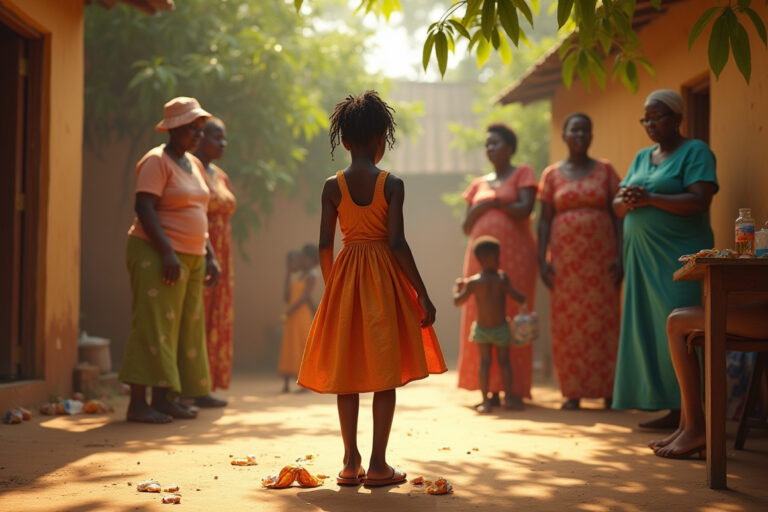“She stole?”
“Yes.”
“Ah. Call the pastor. Call the imam. She needs to be cleansed.”
The courtyard was unusually quiet, heavy with the scent of boiling herbs and apprehension. A girl stood in the middle, clutching the hem of her skirt, eyes darting from the matriarchs whispering in corners to the men fanning themselves in righteous anger. A broken biscuit wrapper lay at her feet, the apparent evidence of a serious moral crisis.
“She stole?” asked the elder.
“Yes, mama. She took three sweets from the teacher’s drawer,” came the whispered reply.
A sigh. A shake of the head.
“And she’s a girl?”
“Yes, mama.”
Silence.
“Ah. This is deep. Is there a history of theft in her mother’s family?”
Cue the drama. A council is called. Teachers, a therapist, a religious leader or two. Questions are asked in hushed tones and sharp stares. What kind of woman would she become? Would she ever find a husband with a record like this? Was she born this way?
Meanwhile, in another corner of the same street, a boy slips a five hundred naira note from his father’s wallet.
“Omo boy. You this stubborn goat.”
A slap, a warning, and the case is closed.
“He’s just a boy. Boys do that sometimes. He’ll outgrow it.”
Will he?
It’s all nonsense, of course. But it’s the kind of nonsense that shapes lives. Shapes futures. Shapes policies.
Because this is still very much a man’s world. One where mistakes are masculine by default and therefore forgivable. Where wrong is gendered. A man can be wrong. But when a woman is wrong, she is very wrong. Irredeemably wrong. Historically wrong.
Consider this: a man cheats on his wife. People shrug. He’s a man. It happens.
A woman cheats? Suddenly, the devil is involved. Fire must fall. Deliverance must take place. Hell has been stirred.
There’s even a word for it. Nymphomaniac. An offensive term for a woman regarded as being excessively interested in sex. Offensive, not just in meaning, but in construction. Why is there no equivalent word for men? Why is male hypersexuality a joke, a rite of passage, a badge of honour?
It’s absurd, but patriarchy is clever like that. It hides behind culture, religion, even language. It filters into churches, mosques, schools, parliament chambers. It’s why the public drags women like Diezani Madueke through coals with a fury never reserved for her male counterparts.
Let’s be clear. This is not a defence of corruption. Corruption, in all its forms, is a rot that must be rooted out. But one must ask. Why is her alleged corruption worse? Why the added venom, the extra weight of shame?
Patricia Etteh. Stella Oduah. The outrage surrounding their names was not just about alleged graft. It was about gender. When men steal, the country shrugs. Na normal level. When women are accused, the nation screams, See why women shouldn’t be in power?
Suddenly, the crimes of three or four women become proof that no woman should ever hold office again. But the thousands of men who have stolen us blind? That’s just politics as usual.
And here lies the tragic irony. In places where women are better represented in government, corruption drops. Development rises. Scientific studies have proven it, again and again.
A World Bank study in 2001 found that an increase in women’s participation in government results in a 20 percent drop in corruption. In Indian villages led by women, bribes were lower by 2.7 to 3.2 percent. Peru cut traffic corruption by hiring 2,500 female road officers. Mexico followed suit. In Indonesia, Sri Mulyani Indrawati reshaped public finance with integrity and foresight. In India, reserving 30 percent of local seats for women improved sanitation, schools, water, and more.
Why? Because women, more often than not, prioritise community needs over personal ambition. They focus on schools, clinics, clean water. Not just contracts and convoys. They run for office not just to be somebody, but to do something.
Of course, women are not saints. We make mistakes. Some even steal. But fairness demands that our wrongs be judged with the same scale, the same scrutiny, the same capacity for forgiveness as the men beside us.
This bias is not just unfair to women. It is harmful to society. Patriarchy is not simply an enemy of women. It is an enemy of progress.
So the next time a girl makes a mistake, ask yourself. Would you have raised the alarm if she were a boy?
The next time a woman is dragged for wrongdoing, ask. Is it really about the crime, or is it about her gender?
We are not asking for blind loyalty. Only balance. Not for perfection. Just parity. Let us be judged not by how female we are, but by how human.
And when we fail, because we will, like all humans do, let us fall with dignity. Not disgrace.





